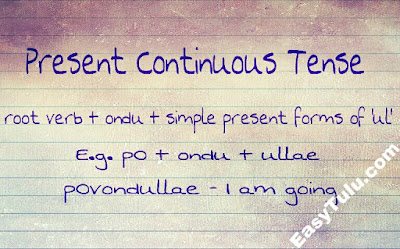Hello All! Welcome back!
Today we are going to learn negative and interrogative form
of sentences in Present Continuous Tense.
We already know Present Continuous Tense in Tulu.
E.g: yAn bareyondullae (bareyondu + ullae) – I am writing
All we need to do is just replace the verb ‘ul’ with ‘ijji’ to
make our sentences negative in present continuous tense.
yAn ijjae – I am not
I ijja – You are not
Aye/imbe ijje – He is not
Al/mOlu ijjal – She is not
au/undu ijji – It is not
nama/enkulu ijja – We are not
Ir/nikulu ijjar – You are not
akulu/mokulu/Ar/mEr ijjer – They are not
undekulu/aikulu ijja – They are notI am not writing >> yAn bareyondu ijjae (Kannada: nAnu bareyuttilla)
yAn bareyondijjae – I am not writing
I bareyondijja – You are not writing
Aye/imbe bareyondijje – He is not writing
Al/mOlu bareyondijjal
– She is not writing
au/undu bareyondijji
– It is not writing
nama/enkulu
bareyondijja – We are not writing
Ir/nikulu
bareyondijjar – You are not writing
akulu/mokulu/Ar/mEr bareyondijjer – They are not writing
undekulu/aikulu bareyondijja – They are not writing
Let’s see more examples:
pAter (pAteruni) – To speak/talk
yAn pAterondijjae – I am not speaking
I pAterondijja – You are not speaking
Aye/imbe pAterondijje – He is not speaking
Al/mOlu pAterondijjal
– She is not speaking
au/undu pAterondijji
– It is not speaking
nama/enkulu
pAterondijja – We are not speaking
Ir/nikulu
pAterondijjar – You are not speaking
akulu/mokulu/Ar/mEr pAterondijjer – They are not speaking
undekulu/aikulu pAterondijja – They are not speaking
yAn pOvondijjae – I am not going
I pOvondijja – You are not going
Aye/imbe pOvondijje – He is not going
Al/mOlu pOvondijjal –
She is not going
au/undu pOvondijji –
It is not going
nama/enkulu
pOvondijja – We are not going
Ir/nikulu pOvondijjar
– You are not going
akulu/mokulu/Ar/mEr pOvondijjer – They are not going
undekulu/aikulu pOvondijja – They are not going
naDapu (naDapuni) – To walk
yAn naDatondijjae – I am not walking
I naDatondijja – You are not walking
Aye/imbe naDatondijje – He is not walking
Al/mOlu naDatondijjal
– She is not walking
au/undu naDatondijji
– It is not walking
nama/enkulu
naDatondijja – We are not walking
Ir/nikulu
naDatondijjar – You are not walking
akulu/mokulu/Ar/mEr naDatondijjer – They are not walking
undekulu/aikulu naDatondijja – They are not walking
tOju (tOjuni) - To be seen/be visible
yAn tOjondijjae – I am not visible
I tOjondijja – You are not visible
Aye/imbe tOjondijje – He is not visible
Al/mOlu tOjondijjal –
She is not visible
au/undu tOjondijji –
It is not visible
nama/enkulu
tOjondijja – We are not visible
Ir/nikulu tOjondijjar
– You are not visible
akulu/mokulu/Ar/mEr tOjondijjer – They are not visible
undekulu/aikulu tOjondijja – They are not visible
Example Sentences:
Tulu: yAn illaDe pOvondijjae
English: I am not going home
Kannda: nAnu manege hOgtilla
Tulu: I satya paNondijja
Englis: You are not saying the truth
Kannada: nInu satya hELtilla
Tulu: Aye jettondijje
English: He is not sleeping
Kannada: avanu malagtilla
Tulu: Al tulu kaltondijjal
English: She is not learning Tulu
Kannada: avaLu tulu kalitilla
Tulu: barsa barondijji
English: It is not raining
Kannada: maLe bartilla
Tulu: jOkulu bultondijja
English: The babies are not crying
Kannada: makkaLu aLutilla
Tulu: AkAshoDu pakkilu rAvondijja
English: Birds are not flying in the sky.
Kannada: AkAshadalli hakkigaLu hArtilla
Tulu: enkulu iren kAtondijja
English: We are not waiting for you
Kannada: nAvu nimannu kAytilla
Tulu: nikulu bAkil dettondijjar
English: You are not opening the door
Kannada: nIvu bAgilu tereyuttilla
Tulu: ittae enk dAla tOjondijji
English: Now, I can’t see anything
Kannada: Iga nanage EnU kANutilla
In Tulu Present Continuous tense is also used for Present
Perfect Continuous.
Examples:
Tulu: Aye onji varshoDdinchi eNDa pAterondijje
English: He has not been speaking with me for one year.
Kannada: avanu ondu varshadinda nannondige mAtADtilla
Tulu: mUji dinaDdinchi barsa barondijji
English: It has not been raining for 3 days
Kannada: mUru dinadinda maLe bartilla.
Interrogative form of sentences in Present Continuous Tense:
We have to add ‘a’ or
‘na’ at the end to make interrogative form of sentences in Tulu. When speaking with
elders/strangers with respect, you can add ‘e’ or ‘ne’ instead of ‘a’ or ‘na’
at the end.
Tulu: yAn barondullena?
English: Am I coming?
Kannada: nAnu bartiddEna?
Tulu: nama sAleg pOvondullana?
English: Are we going to school?
Kannada: nAvu shAlege hOgtiddEva?
Tulu: I ittae Odondijjana?
English: Aren’t you reading now?
Kannada: nInu Iga Oduttilva?
Tulu: Ir ittae uNondijjare?
English: Aren’t you having lunch now?
Kannada: nIvu Iga UTa mADtilva?
Tulu: nikulu bElae maltondijjara?
English: Aren’t you working?
Kannada: nIvu kelasa mADtilva?
Tulu: Aye niNDa dAla paNondullena?
English: Is he telling you anything?
Kannada: avanu ninnalli EnAdarU hELtiddAna?
Tulu: Al teltondullala?
English: Is she smiling?
Kannada: avaLu nagtiddALa?
Tulu: nAyi koretonduNDa?
English: Is the dog barking?
Kannada: nAyi bogaLuttideya?
Tulu: puchchae pEr parondijja?
English: Isn’t the cat drinking milk?
Kannada: bekku hAlu kuDitilva?
Tulu: akulu enan lettondijjera?
Kannada: avaru nannannu karitilva?
English: Aren’t they calling me?
Click here to go to Vocabulary page.
Click here for Video lessons
Alright! If you need more sentences translated in Tulu,
please leave a comment. If you find this lesson helpful, please share it with
your friends who wish to learn Tulu J
See you next week!
solmelu!



